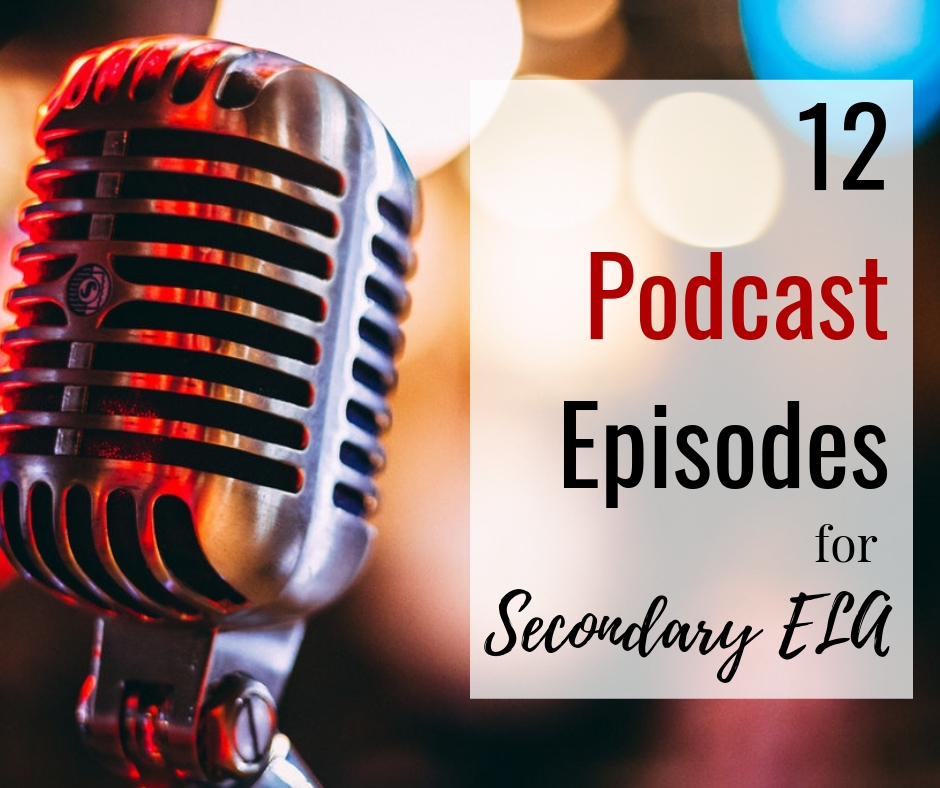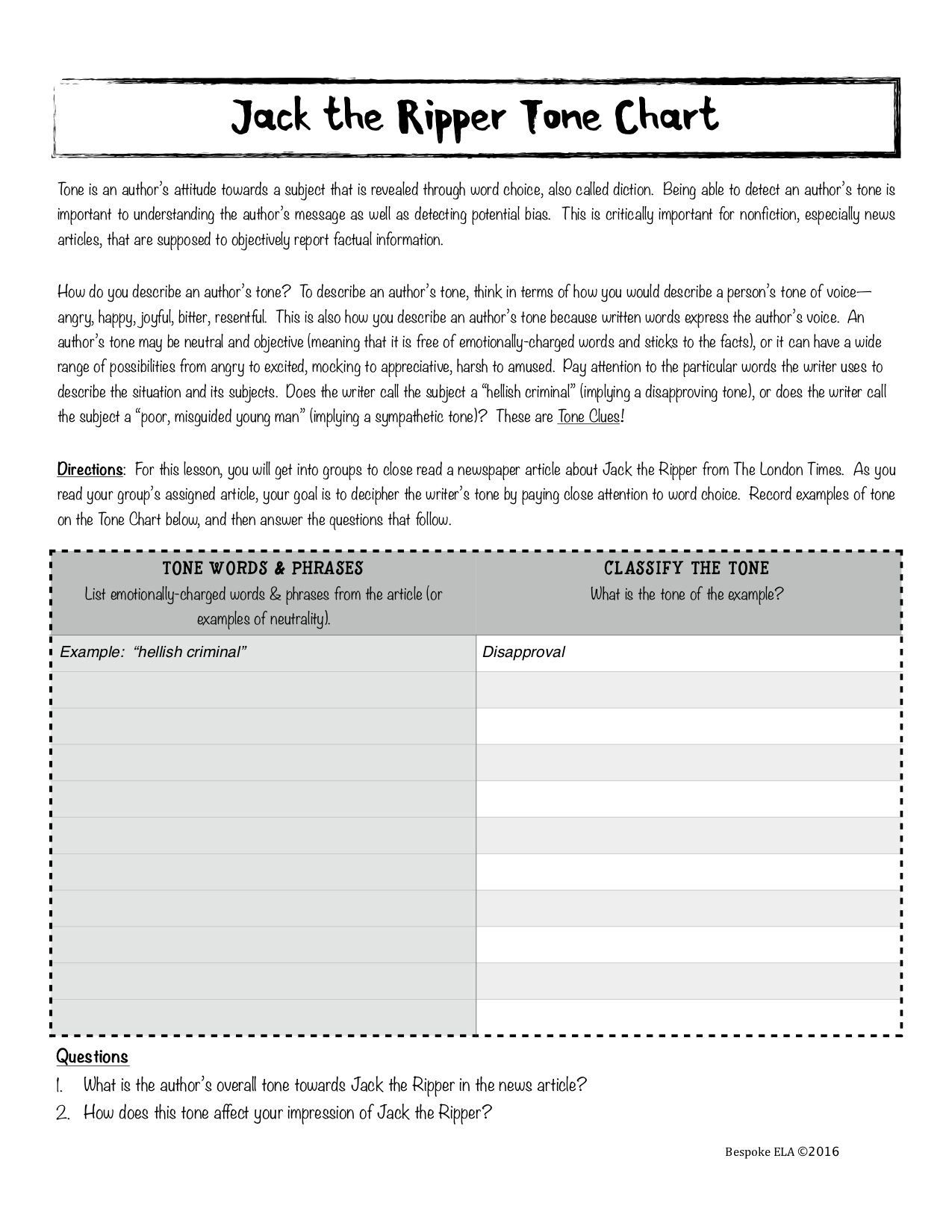I will admit it. I have become a podcast junkie. And I’m not ashamed. I catch myself listening in when I’m driving in the car, doing the dishes, or even grading papers. In fact, I even look FORWARD to doing chores around the house because they give me a chance to sneak away and catch some listening time. I look forward to the summer months when I have even more time to tune in. Because I am now a certifiable podcast junkie, I sought out 12 podcast episodes that I could use in my secondary ELA classes so that I could bring my obsession into the classroom. Listen while I work??? That is a win-win!
Here are 12 podcast episodes to use in your secondary ELA classes:
“Jack the Ripper— Infamous and Unknown” by Unexplained Mysteries
Warning: This podcast contains graphic details of the murders. Not advised for listeners under the age of 13. This story spans two podcast episodes and recounts the grizzly murders of the infamous “Jack the Ripper” in 1880s London. Jack the Ripper became one of the most notorious serial killers of all time. And he was never caught. There are over 100 theories about his identity. If you're looking for a high-interest nonfiction topic to get your students interested in analyzing nonfiction, this is it! In fact, I have created a nonfiction resource specifically about this case that has students analyze the tone and bias of the media coverage on the case. Click here to access the product, and click here to read about a lesson plan that compares the story of Jack the Ripper to the song “Mack the Knife.”
“How the Donner Party Worked” by Stuff You Should Know
In this episode of Stuff You Should Know, the hosts explore the very “grim,” yet infamous story of the Donner Party who attempted to migrate from the midwest to California in 1846-47, but they became stuck in the Sierra Nevada mountain range during winter and resorted to cannibalism to survive. Modern allusions to the noted cannibalism of this story have kept it as part of the “lore” of American history. In this episode, the hosts discuss the “true” history of the Donner Party and the conditions that led them to cannibalism. Students will be fascinated by the gory details of this story and will come away with an understanding of modern-day allusions to this American tragedy.
“Cannabis” by Say Why to Drugs
The reason I chose this episode is because marijuana is the most widely used illegal drug in the United States. And students are fascinated with it. “MJ,” “pot,” “weed,” “skunk”— whatever you want to call it— is a huge part of the drug conversation in the 21st-century. In this episode, psychologist Dr. Suzi Gage discusses the “addiction” to cannabis, the effects of ingesting cannabis, and the medical benefits of the drug. She also discusses the fact that marijuana is potentially harmful to teenagers due to the fact that their brains are still developing and also how there is a correlation between marijuana usage and lowering your IQ and causing loss of motivation. I think this is an important topic for teenagers to learn more about due to their exposure to the drug during their high school/ college years.
“Poisoned Pill— The Chicago Tylenol Murders” by Unsolved Murders
Do you ever think twice before taking a Tylenol? This story spans two episodes about the infamous “Tylenol Murders” that haunted Chicago in the 1980s. These murders claimed the lives of seven people. After these murders, it took Tylenol many years to regain the trust of consumers. Students will be fascinated by this infamous murder case as the hosts piece together the story and facts of the case.
“The History of Grading” by Footnoting History
In this episode of Footnoting History, host Nathan discusses the fact that the concept of “grading” is a recent development and the fact that for most of human history, grades did NOT EXIST! This will definitely get students rethinking how they are assessed in school. It’s so easy for us to accept things as they are because we assume that’s how they’ve always been— but with education, that is not the case. The modern American education system is just that— MODERN! Students will be intrigued to learn about how our education system was created and also about other methods of education from the past.
“Confronting Racism” by TED Radio Hour
This podcast explores the nuances of racism in American society such as the “whiteness” of time and how racism isn’t always obvious but can be found everywhere. It “explores the effects of everyday and systematic racism in America— and how we can work to defeat it.” In our diverse America, continuing conversations about racism is necessary. It is only through confronting racism— identifying it and facing it— that we can learn how to defeat it. This starts in the classroom.
“Gathering the Magic” by 99% Invisible
This podcast explores the background of the card game called “Magic the Gathering.” This card game has survived the “onslaught” of digital video games since its creation in the 1990s. In this episode, the host explains how the game works and how it has evolved over time. It also explores how and why this game has continued to grow a cult following for over 20 years. Students may have heard of this game but not really know much about it, so this is an opportunity to learn about Magic the Gathering and also consider how games have evolved during their lifetimes.
“Take me out to the Ball Game” by Between the Liner Notes
This podcast takes listeners on a journey through the creation of music. In this episode, the host explores how the infamous baseball song “Take me out to the Ball Game” became the 7th-inning “stretch” opus. “If it wasn’t for a device called the magic lantern, first-wave feminism, and a sportscaster named Harry Caray, our familiar custom wouldn’t exist.” Students will learn about this baseball tradition as they listen in on the history of “Take me out to the Ball Game.”
“The King of Tears” by Revisionist History
Revisionist History is the podcast by iconic writer Malcom Gladwell, author of The Tipping Point, Blink, Outliers, What the Dog Saw, and others. In this episode, Gladwell explores the differences between country music and rock-in-roll. He explores the pathos of the country music genre and why it evokes such a strong emotional response while rock music does not. This is a high-interest topic that will get students debating and discussing genres of music.
“4 Ways to Deal with FOBO (Fear of a Better Option)” by Killer Innovations
In this episode, Phil McKinney talks about how a fear of a better option (FOBO) can lead to FOMO (fear of missing out), which can paralyze the decision-making process. These terms have become popular on social media because there is a real issue with the fear of missing out on something even better or not being as “cool,” “beautiful,” “awesome,” or “perfect” as other people. McKinney gives four practical options for dealing with FOBO/ FOMO. This is a topic that high school students need to hear because it gives them more context for these terms but also helps them prioritize decisions— something that is crucial for young people who are learning how to manage time and make plans for the future.
“Empower a Girl, Transform a Community” by Kakenya Ntaiya for TED Talks
In this eye-opening podcast by Kakenya Ntaiya, she shares her experiences starting a girls’ boarding school to protect girls from sexual assault, underage marriages, and genital mutilations. She profiles the stories of two students who serve as examples of cultural change. These girls have started a cultural revolution in their communities that has led to the possibility of a new frontier of progress for women. High school students can gain a more worldly perspective by listening to this podcast. It is so often that our American students take their free education for granted. But when they realize that what they have is a real gift and that other students in other countries struggle for the right to learn, American students can begin to appreciate what they have and use this gift to give back.
“Creative Ways to Get Kids to Thrive in School” by Olympia Della Flora for TED Talks
In this podcast, school principal Olympia Della Flora revolutionized her school with innovative, out-of-the-box strategies to help the emotional well-being of students. She talks about how “small changes can make huge differences.” This is an important conversation because we see many students and schools at-risk of falling through the gaps that exist in traditional pedagogies. Students will be inspired to think about new ways schools can reach all students and develop the emotional realm of existence rather than just the realm of academia.
Subscribe to Bespoke ELA to gain access to the FREEBIE LIBRARY where you will find this FREE “Podcast Listening Guide" to use with any podcast episode. Find TONS of other freebies by Bespoke ELA to use in your classes TODAY by clicking HERE.
About the Author
Meredith is the founder and creator of TeachWriting.org and Bespoke ELA. She has taught high school English for 10+ years in Dallas, Chicago, and New York City and holds a M.A. in Literature from Northwestern University. She has always had a connection to the written word-- through songwriting, screenplay writing, and essay writing-- and she enjoys the process of teaching students how to express their ideas. An avid tea drinker and anglophile, Meredith enjoys life with her husband, daughter, and sweet pups.














